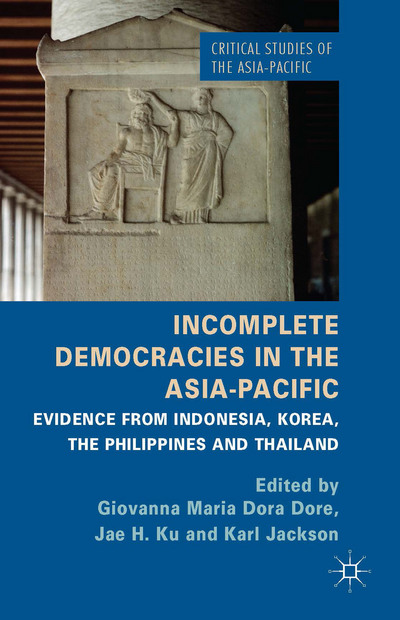Incomplete Democracies in the Asia-Pacific is a data-driven book that engages fruitfully with existing scholarship on democratic theory. Given the less than sanguine outlook on democratisation, its timing is propitious, writes Stephan Burklin.

Alighting onto the streets of Philadelphia at the close of the constitutional convention, Benjamin Franklin was asked what kind of government had been created. In his lapidary style, he quipped, “A republic, if you can keep it”.
More than two centuries hence, as notionally democratic regimes from Ankara to Caracas succumb to authoritarian drift, Franklin’s remark underscores the fragility and reversibility of representative government. As Franklin presciently understood, democratic consolidation requires more than voters and ballot boxes; stable liberal democracies need the software to enable continuous dialogue between the electorate and their representatives, including sympathetic public opinion, responsible leadership, and mature institutions.
Incomplete Democracies in the Asia-Pacific, the first book to emerge from John Hopkins University’s School of Advanced International Studies’ (SAIS) Democracy Project, explores the scholarly lacuna between democratic genesis and democratic consolidation in four Asian nations: Indonesia, the Republic of Korea (henceforth Korea), the Philippines, and Thailand. A cursory historical glance reveals divergent paths: Indonesia’s nascent post-war democracy was derailed by decades of autocratic leadership under presidents Sukarno and Suharto; the Republic of Korea waffled between democracy and authoritarianism until the army was finally pushed out of politics in the late 1980s; the Philippines’ democratic heritage was punctuated by dictatorship from 1972 to 1986; and Thailand’s tumultuous trysts with democracy have resulted in 19 coups since 1932. Why has democratisation been so difficult for these countries?
Equipped with considerable regional expertise and longitudinal data from two multi-country opinion surveys, the authors probe the symbiotic relationship between public attitudes and elite behaviour and institutions. Focusing on the beliefs and opinions of ordinary citizens, the authors analyse the effects of traditional social structures on civil society, the chronic weakness of political parties, and ambivalence towards popular sovereignty. What emerges is a nuanced portrait of four Asian democracies that clarifies why, at a given point in time, democracy prevails in one country but fails in another.
Although democratic trajectories vary, the authors’ findings across all four countries suggest that democratic theory is at best only partially isomorphic with reality. In particular, the data problematises the notion that a growing middle class will inexorably demand more freedom and self-determination. The “myth of middle-ization”, which imputes the qualities of the 19th century European bourgeoisie to Asia’s rising middle classes, is at variance with the empirical evidence; democracy in the four countries is of the trickle-down rather than the bottom-up variety.
Several postulates of democratic theory are contested by the data in further detail. For instance, the notion that greater participation in civil society organisations will lead to more democracy is undermined by the fact that Korea, arguably the most democratic of the four countries, has the lowest density of civil society membership. Further, greater non-electoral participation does not necessarily entail greater democratisation because Asian societies remain regulated by unwritten hierarchical norms. Vertical patron-client relationships in Thailand or family-centric groups in the Philippines maximise the interests of narrow, parochial interests rather than the interests of broader social groupings extending more widely across polities, thus hampering democratic consolidation. Survey findings also indicate that positive evaluations of democracy do not necessarily produce greater demand for democratic forms of accountability; respondents who affirm democracy also retain positive views of authoritarianism. In the words of the authors, this makes support for democracy “a mile wide and an inch deep”.
One can hardly cavil with the methodology; the authors strike a balance between generalising cross-national comparisons and contextualising their findings to mitigate the problems of cross-cultural validity. Nonetheless, some readers may be disappointed that this publication ignores the proverbial dragon in the room. The rise of China is treated as an exogenous variable and thus eclipsed in this analysis. But can the halting progress towards democratic consolidation in the Asia-Pacific be explained without reference to a rising superpower with competing conceptions of legitimacy? Can democratic erosions under Park Chung-hee in Korea or Marcos in the Philippines be fully accounted for without reference to the Cold War context? Regrettably, the authors eschew the implications of structural shifts in the international environment.
Incomplete Democracies is a data-driven book that engages fruitfully with existing scholarship on democratic theory. Given the less than sanguine outlook on democratisation, its timing is propitious. As the Thai army’s recent foray back into politics illustrates, democratisation is not a one-way street. None of this book’s evidence is dispositive, but it does call into question the postulates of democratic theory that are deemed essential to democratic consolidation. Because the public opinion software remains a work in progress, national leaders and urban elites carry a heavy burden to inculcate democratic values among themselves and across their societies. The road to full democratic consolidation remains dauntingly long, but this book is a valuable contribution to scholars and practitioners alike who seek greater understanding of the process to hasten the journey.
Stephan Burklin is an MSc candidate in International Political Economy at the London School of Economics. He holds a BA in International Relations from Wheaton College (IL). Prior to his master’s program, he did stints at the Konrad-Adenauer Foundation, the US Senate, and the American Enterprise Institute.






